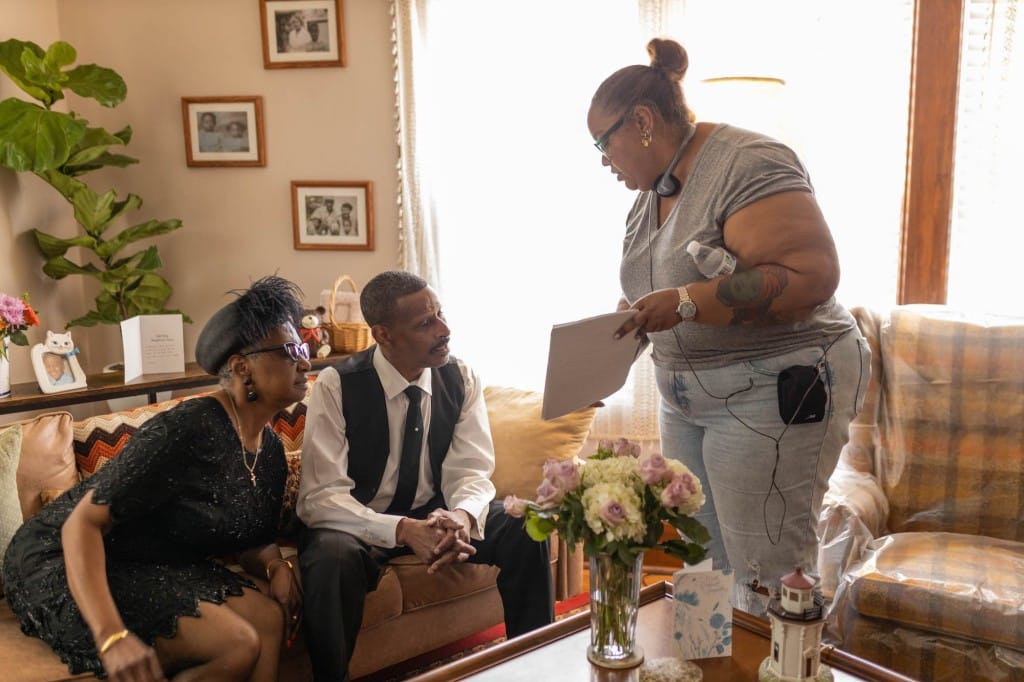
When husband-and-wife filmmaker team Thaad and Eden Sabolboro received a grant from Black Public Media to create a film about vaccine hesitancy in the Black community, they wanted to do things differently.
The Sabolboros’ Reel Clever Films production company normally works in a documentary style. But the duo decided to shift to a narrative format to tell the story of medical mistrust and vaccine hesitancy in the Black community. They collaborated with Detroit-based screenwriter, director, and producer Toni Cunningham, who wrote the screenplay.
Their short film, WELL, centers around themes of community, identity and resilience. It relates the story of a Black family living in Flint through 50 years of health crises, from the Tuskegee experiment to the Flint water crisis to COVID-19. After losing a loved one to COVID-19, the family must reckon with the harm caused by the medical establishment.
Planet Detroit spoke with Cunningham and Eden Sabolboro about their filmmaking journey.

Planet Detroit: How did this film project begin?
Eden Sabolboro: The project started when I saw an announcement from Black Public Media about a grant opportunity focused on Black media stories in Michigan and North Carolina. It was intriguing, and I saw it as a chance to explore vaccine hesitancy through our work. Initially, we thought about a documentary but quickly realized our hearts were set on creating a narrative film. It felt like a natural return to our storytelling roots.
PD: Why did you decide to shift from a documentary to a narrative format?
Sabolboro: We’ve always been drawn to narrative storytelling. It allows for a deeper emotional connection with the audience. With this project, we wanted to inform and engage and resonate on a personal level. The narrative format seemed the best way to do that.
It isn’t often that you have the opportunity to have the funds to create fiction work. We wanted to push our creativity and storytelling powers, and thus we decided to go narrative, allowing us to weave an impactful and empathetic story.
PD: Can you describe the screenplay writing process?
Toni Cunningham: I drew inspiration from personal family experiences and historical events like the Tuskegee experiment and the Flint water crisis. We wanted to connect these past events with the current pandemic to explore themes of trust and hesitancy. It was crucial that the screenplay not only told a story but also sparked a conversation.
PD: What were the main challenges in bringing this film to life?
Cunningham: The production logistics were challenging, especially transforming the main set to reflect different decades. We were fortunate to have a talented production designer, Ilana Portney-Preston , who did an amazing job. Another challenge was a tight timeline, but with a dedicated team, we managed to bring everything together.
PD: How did you go about assembling your cast and crew?
Sabolboro: We wanted actors who could authentically portray the characters and a crew that was passionate about the project. We worked with Jon Tomus Talent for casting and were meticulous in our selection process. Our crew was a mix of seasoned professionals and enthusiastic newcomers, all committed to the project’s vision.
PD: What has been the most rewarding aspect of this experience?
Cunningham: For me, the collaboration and the deepened relationships have been incredibly rewarding. We’ve created something that we’re all proud of, something that resonates with audiences and starts important conversations.
PD: What are your hopes for the film’s impact and distribution?
Sabolboro: We’re now focused on getting the film out through community screenings and festivals. We hope to foster discussions about vaccine hesitancy and broader issues of trust in healthcare within marginalized communities. We hope the film not only entertains but also educates and sparks empathy.
Watch the film here:

